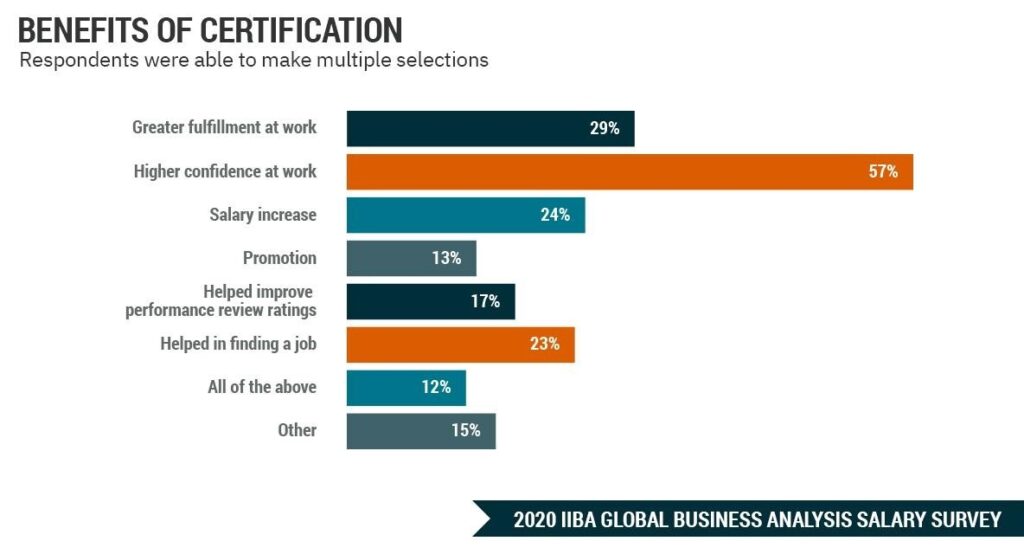Last Updated on September 18, 2025 by Techcanvass Academy
Table of Contents
Overview
The International Institute of Business Analysis (IIBA) is an industry leader worldwide in Business Analysis Certifications. IIBA certifications are globally recognized and most organizations prefer recipients of these Certifications over their non-certified counterparts. An IIBA Certification prepares and equips business analysis professionals with expertise and key competencies to succeed in this profession and significantly contribute to their career advancement.
These globally recognized certifications improve the marketability, employability, and earning potential of their recipients. In this article, we are going to see the differences between CCBA vs CBAP from various perspectives:
There are three core Business Analysis Certifications offered by IIBA.
- Entry Certificate in Business Analysis (ECBA) – ECBA Certification recognizes individuals ready to develop their Business Analysis skills, knowledge, and traits to become Business Analysis practitioners.
- Certification of Capability in Business Analysis (CCBA) – CCBA Certification recognizes mid-level business analysis professionals who have 2-3 years of practical Business Analysis work experience.
- Certified Business Analysis Professional (CBAP) – CBAP Certification recognizes senior business analysis professionals who have 5+ years of practical business analysis work experience.
CBAP and CCBA are two of the most prestigious Business Analysis Certifications awarded by the International Institute of Business Analysis (IIBA), Canada. However, there is quite a bit of confusion on which IIBA Certification should an experienced Business Analyst take up. In this article, we are going to have a detailed comparison of CCBA Vs CBAP and how to decide on the right certification.
CCBA vs. CBAP – How to Prefer Between Two?
When it comes to deciding between these two certifications, you need to consider the following:
- Considering CCBA and CBAP differ in eligibility criteria, which certification are you eligible for?
- If you meet the eligibility criteria for CBAP, do you have the time and determination in order to go for CBAP, the Gold standard for Business Analysis Certification?
Both CCBA and CBAP Certifications are for experienced Business Analysis professionals, yet there is a significant difference between both. The main difference is in terms of the overall amount of Business Analysis experience required.
Other Major Differences
In the case of CCBA Certification, the applicant must complete a minimum of 3,750 hours of Business Analysis work experience in the last 7 years. Within this experience, a minimum of 900 hours must be completed in each of 2 of the 6 BABOK® Guide Knowledge Areas OR, a minimum of 500 hours must be completed in each of 4 of the 6 BABOK® Guide Knowledge Areas.
For CBAP, the applicant must complete a minimum of 7,500 hours of Business Analysis work experience in the last 10 years. Within this experience, a minimum of 900 hours was completed in 4 of the 6 BABOK® Guide Knowledge Areas, for a total of at least 3,600 of the required 7,500 total.
CBAP is undoubtedly the most recognized and valued Business Analysis Certification. It is also the most respected and highly regarded as clearing CBAP establishes that the recipient has diversity and depth of Business Analysis knowledge, skills, and experience. The choice is clear. If you are eligible for Certified Business Analysis Professional (CBAP), do take the extra effort in order to go for CBAP Certification.
If you do not meet the eligibility criteria, you can choose in order to go for CCBA as an interim certification as it adds value to your profile and enhances your marketability & employability. You can increase your knowledge in Business Analysis, work with the aim of becoming eligible for the CBAP before the period of re-certification.
CCBA vs CBAP – Important Differences
Let us look at the key differences between CBAP and CCBA from the perspective of eligibility criteria, exam pattern, certification & exam fees, and other factors.
| CCBA® | CBAP® |
| Candidates | Candidates |
| Mid-Level Business Analysts | Senior Business Analysts |
| Eligibility Criterion – Work Experience | Eligibility Criterion – Work Experience |
| Minimum 3750 hours of BA work experience in the last 7 years within this experience, a minimum of 900 hours in each of 2 of the 6 BABOK® Guide Knowledge Areas OR, a minimum of 500 hours in each of 4 of the 6 BABOK Guide Knowledge Areas | Minimum 7500 hours of BA work experience in the last 10 years within this experience, a minimum of 900 hours in 4 of the 6 BABOK Guide Knowledge Areas, for a total of at least 3,600 of the required 7,500 total |
| Eligibility Criterion – Professional Development Hours | Eligibility Criterion – Professional Development Hours |
| Minimum 21 hours of Professional Development within the last 4 years | Minimum 35 hours of Professional Development within the last 4 years |
| Eligibility Criterion – References Needed | Eligibility Criterion – References Needed |
| Two references from a Career Manager, Client, or CBAP Recipient | Two references from a Career Manager, Client, or CBAP Recipient |
| Exam Fees | Exam Fees |
|
Application Fee – $125 Region 1 – $55, Region 2 – $85, Region 3 – $125) |
Exam Fee –$325 (for Member)$450 (for Non-member) Region 1 – $55, Region 2 – $85, Region 3 – $125) |
| Exam Pattern | Exam Pattern |
| 3 hours long 130 multiple choice questions Scenario-based Questions | 3.5 hours long 120 multiple choice questions Scenario-based + Case Study-based Questions |
| Exam Syllabus | Exam Syllabus |
| Business Analysis Planning and Monitoring-12% Elicitation and Collaboration- 20% Requirements Life Cycle Management- 18% Strategy Analysis- 12% Requirements Analysis and Design Definition -32% Solution Evaluation – 6% | Business Analysis Planning and Monitoring –14% Elicitation and Collaboration- 12% Requirements Life Cycle Management –15% Strategy Analysis – 15% Requirements Analysis and Design Definition – 30% Solution Evaluation – 14% |
| Difficulty Level | Difficulty Level |
| Medium | High |
| Brand Value | Brand Value |
| BAs who hold an IIBA CCBA® Certification earn 8% more vs. those non-certified (as per IIBA’s 2020 Global Business Analysis Salary Survey) | BAs who hold an IIBA CBAP® Certification earn 26% more vs. those non-certified (as per IIBA’s 2020 Global Business Analysis Salary Survey) |
You can also check this video –The Differences Between CBAP & CCBA
How Do The Hours Get Calculated?
Note: This calculation is conservative and should work in most scenarios.
- Number of working hours per day – 7 hrs
- The Number of days in a week – 5 Days
- Number of working days per month – 22 Days
So, the number of hours per month = 154. Please note that you cannot count all the hours towards Business Analysis work. I would recommend that you consider around 60-65% towards Business Analysis work.
As a professional, you participate in activities that may not consider Business Analysis. For example, creating status reports, and participating in meetings not related to a project or customer.
Simply speaking, As a result, you need 3-3.5 years of Business Analysis experience for CCBA and 5+ of experience for CBAP Certification.
CCBA vs. CBAP – Exam Preparation
The exam preparation for CCBA and CBAP involves common preparation methods like studying the BABOK (v3) guide and/or additional simplified reference guides, CBAP preparatory training through IIBA’s Endorsed Education Providers, practicing sample exam questions, and additionally joining study groups and taking guidance from mentors.
The difference lies in that the CBAP exam is more complex and hence needs more determination & dedication as compared to the CCBA exam. In CBAP, there are case-study-based questions in which there is a case study of 1-1.5 pages and multiple questions on it. An adequate amount of practice is needed to be able to become proficient at solving such questions.
More and more knowledge areas specific sample questions and simulation tests need to be practiced as an important preparatory step for the CBAP exam. CCBA exam needs a good amount of practice too but not of the same level considering it’s less complex than CBAP.
CBAP needs an applicant to complete a minimum of 35 hours of Professional Development whereas CCBA needs 21 hours of Professional Development hours. Thus, CBAP needs an applicant to devote additional time and effort to fulfilling the Professional Development eligibility criterion as compared to CCBA.
IIBA Membership and Exam Fees
Since, The CBAP and CCBA Certifications comprise membership, application, and exam fees. Here is a breakdown of these charges:
| Knowledge Area | CCBA | CBAP |
| Application Fees | $125 | $125 |
| Exam Fees (Members) | $325 | $325 |
| Exam Fees (Non-Members) | $450 | $450 |
| Exam Retake Fees (Members) | $250 | $250 |
| Exam Retake Fees (Non-Members) | $375 | $375 |
| Membership Fees | $ 55 – 125** | $ 55 – 125** |
**Depends on Regions:
- Region 1 – $125,
- Region 2 – $85,
- Region 3 – $55
CCBA Vs CBAP – Brand Value and Recognition
CBAP is undoubtedly the most recognized and valued Business Analysis Certification. It is also the most respected certification for two reasons:
- Clearing CBAP needs diversity and depth of Business Analysis knowledge
- It is backed and supported by the International Institute of Business Analysis (IIBA)
The choice is clear. If you are eligible for the CBAP certification exam, do take the extra effort in order to go for CBAP certification.
If you do not meet the eligibility criteria, you can choose in order to go for CCBA as it adds value to your profile and provides confidence as it is always in the IIBA Salary Survey.
CCBA vs CBAP Certified Professionals: Job Opportunities And Salary Trends
Certifications from IIBA are globally recognized and significantly contribute toward career advancement in Business Analysis. From entry-level to the intermediate CCBA and more advanced CBAP, a certification in Business Analysis is worth attaining to increase the marketability of its recipients leading to better job opportunities. These certifications recognize the fact that the professional who attained it is highly knowledgeable in Business Analysis and is well equipped to work on critical initiatives.
It is clearly depicted in the below graph taken from IIBA’s 2020 Global Business Analysis Salary Survey Report that progress in current job and new job opportunities are key benefits of attaining certification.

Read more What is The Average CBAP Certification Salary?
Why Do Organizations Hire CBAP vs CCBA?
Organizations hire IIBA certified BA professionals with considerable confidence because of strong faith in their Business Analysis Abilities.
Below are the reasons for preferring a CBAP vs. CCBA certified BA professional –
- The BA professional is extremely skillful and knowledgeable in the field of Business Analysis and will handle highly complex business-critical initiatives with assurance.
- Customers, suppliers, and investors are confident that Business Analysis activities will be carried out with strict adherence to industry standards.
- Industry-based standardized BA tools and techniques will be employed to obtain results that are more reliable thereby enhancing consistency and efficiency.
- Business Analysis Practice or Center of Excellence could be formed, implemented, and maintained in accordance with the BABOK guide.
- Such esteemed Business Analysts are regarded as extremely committed to upskilling themselves and this dedication to learn & grow is always held in high regard by organizations.
About Techcanvass
Techcanvass offers IT certification courses for professionals. We are an IIBA Endorsed Education Provider (EEP), iSQI ATP (for Certified Agile Business Analyst Training) as well as an Agile Testing alliance partner for CP-SAT certification training in Selenium.


